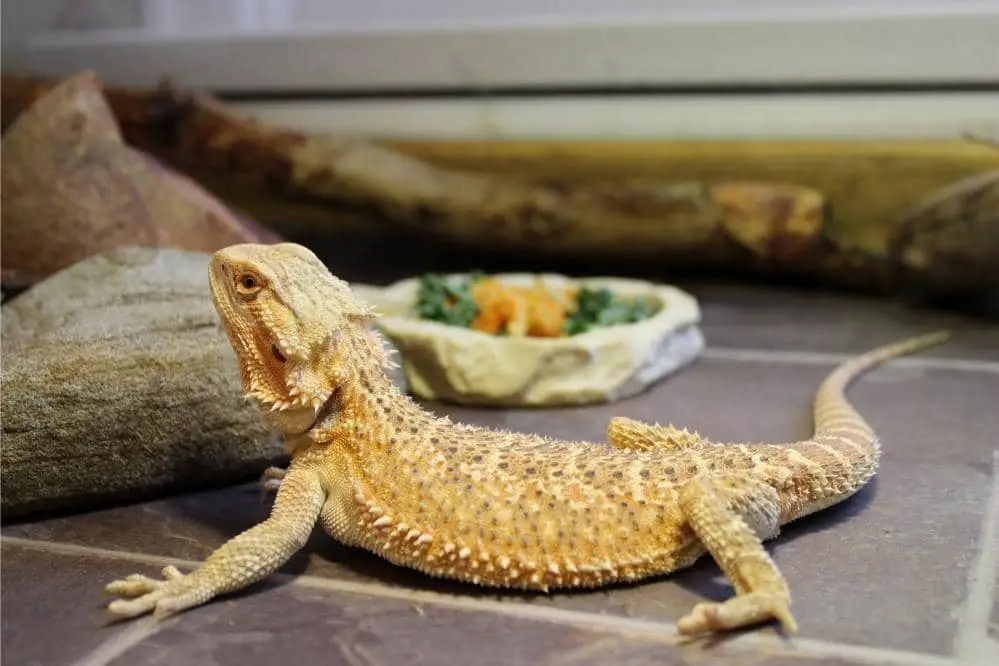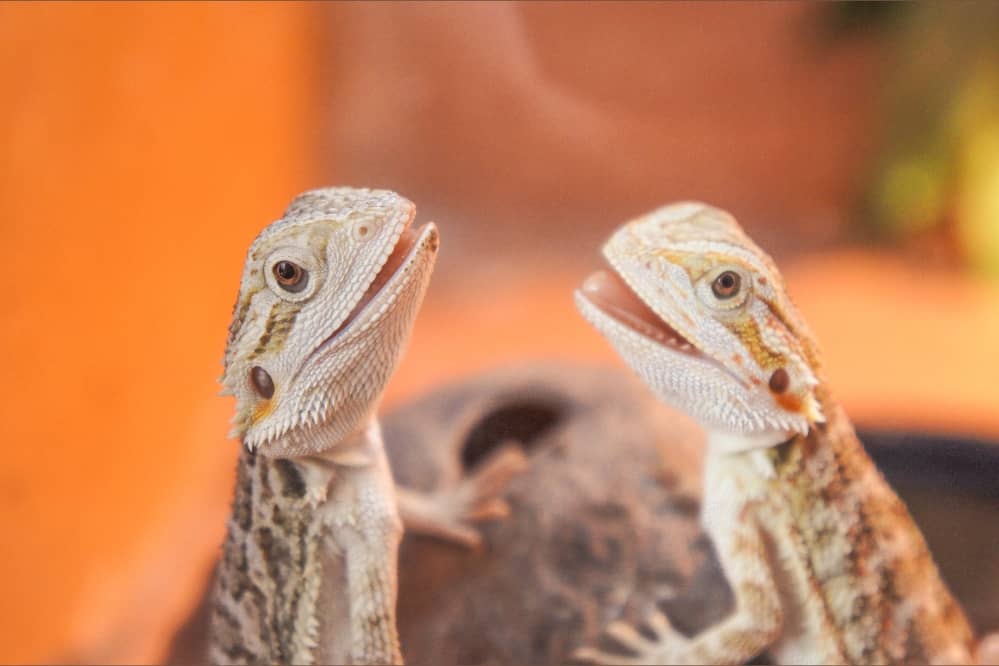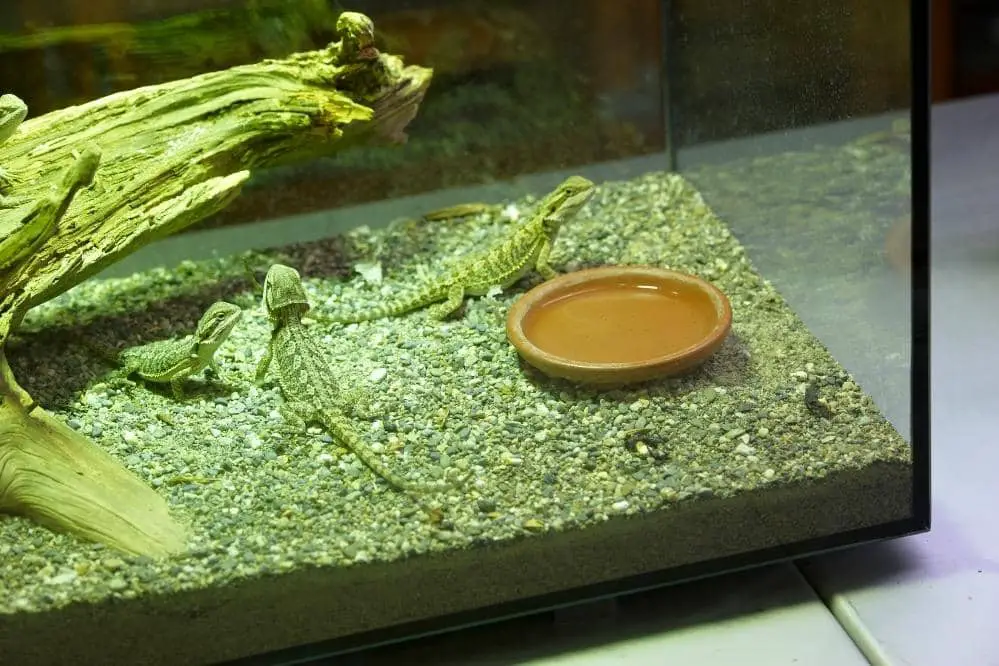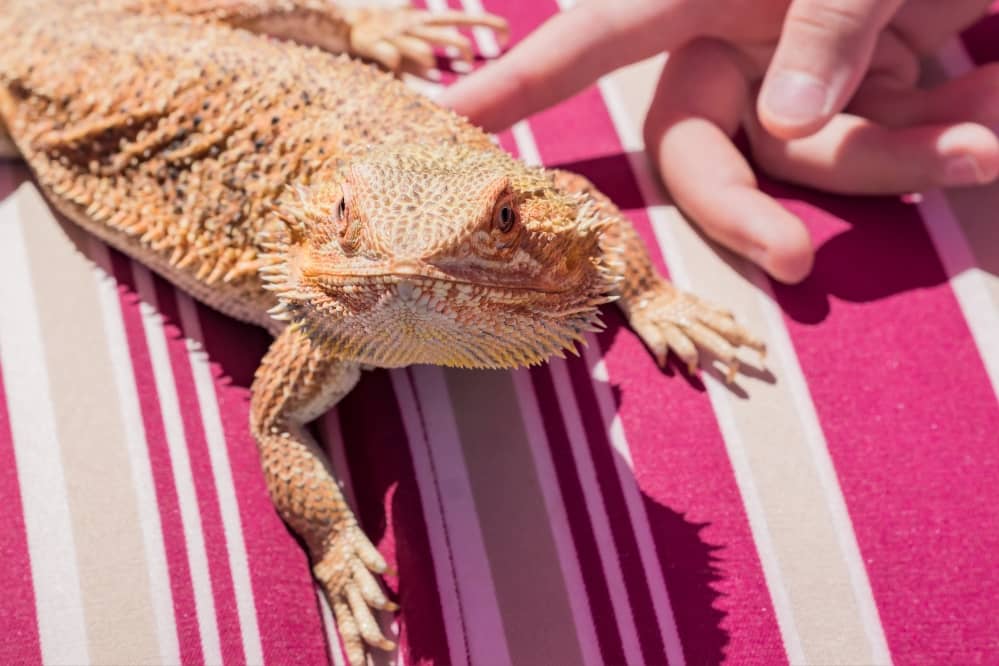Without any preamble, let’s come to the point. Whether it’s human or any other animal (pet or working), being too skinny or obese is not the desired body type. When it comes to our pets, especially bearded dragons (who depend on us for their well-being), it’s crucial to observe their health and overall body condition closely. If you observe that your beardie is becoming too skinny (or obese), you must come forward immediately to rectify the situation; otherwise, your bearded friend can develop different health issues.
Now you might be wondering
- How do I tell if my bearded dragon is skinny or not?
- How do I know if my bearded dragon is losing weight?
- What are the reasons of weight loss in bearded dragons?
- How can I improve the Health of my Bearded Dragon?
- How can I get my bearded dragon to gain weight?
Let’s go over every aspect one by one.
How To Tell If A Bearded Dragon Is Skinny Or Too Thin
Whenever you suspect your bearded friend is skinny, too thin, or weak, the best way is to weigh him and compare it with the standard values in the table below.
| Age (Months) | Category | Size (Inches) | Weight (Grams) |
| 1 | Baby | 3 -4 | 4 – 6 |
| 2 | Baby | 5 – 9 | 8 – 40 |
| 3 | Baby | 8 – 11 | 22 – 110 |
| 4 | Baby | 9 – 12 | 41 – 115 |
| 5 | Baby | 11 – 16 | 102 – 115 |
| 6 | Juvenile | 11 – 18 | 183 – 188 |
| 7 | Juvenile | 13 – 18 | 230 – 280 |
| 8 | Juvenile | 14 – 20 | 252 – 327 |
| 9 – 10 | Adult | 16 – 22 | 280 – 360 |
| 11 – 12 | Adult | 16 – 24 | 350 – 465 |
| 12+ | Adult | 16 – 24 | 380 – 510 |
However, in case you don’t have a weighing scale or don’t want to handle your beardie, often look for the following signs that are generally visible if your bearded dragon is underweight or skinny.
- Skinny legs with no visible muscles or fat.
- Skinny tail with no fat at all, and you can feel bones easily when you touch the tail (a healthy beardie tail doesn’t give a bony feel on touch).
- Ribs are clearly visible.
- More visible hip bones without fat deposits (hip bones are slightly visible with little fat deposition around them in healthy beardies.
- Dull and sunken eyes.
- Loose, sagging skin in different areas of the body, especially the chest and neck.
- Fat pads usually are slightly raised in healthy beardies. Depressed or sunken fat pads indicate weakness or malnourishment.
Reasons Why My Bearded Dragon Is Skinny Or Underweight

Not Getting Enough Food
Naturally, when one sees a weak, too thin, or skinny bearded dragon, the first thing that comes to mind is that he is not getting enough food. This could be because the beardie is not eating the amount he should eat (for any reason), or the owner is not providing enough food or feeding less frequently. In addition, unlike dogs or cats that go well with the same (dry or commercial food) for months, beardies generally get bored of the same food and need variety. So if the owner is offering the same food daily, beardies will reduce intake after a few days leading to weakness and weight loss.
Dental Problems
Another common reason for making bearded dragons eat less than they need is oral and dental issues. Mouth rot or other dental issues makes it difficult for a bearded dragon to chew and swallow food, thus leading to nutritional deficiency.
Internal Parasites
Though bearded dragons carry a few parasites in their gut that generally don’t cause any harm, if the parasite load goes beyond a certain level, they can do a lot of harm to your beardies, including weight loss, loss of body mass, and even death. Coccidia, pinworms, and cryptosporidium are the parasites commonly involved in giving the skinny appearance to a bearded dragon. Among all the death due to parasites in bearded dragons, most deaths are caused by coccidiosis because it spreads rapidly from one beardie to another via feces. Pinworms, on the other hand, generally don’t cause any health issues unless they gain access to the oral cavity and begin affecting food intake.
Illness Or Underlying Disease
If your bearded dragon is losing weight or is already skinny, internal parasites are not the only possible culprits. It’s also possible that your bearded dragon may be suffering from some underlying disease or illness. For example, diseases like mouth rot, MBD (metabolic bone disease), adenovirus, etc., can lead to rapid weight loss. In addition, female beardies can be egg bound or gravid, and the condition can cause serious health concerns, including weight loss.
Related article What are signs of sickness in bearded dragons?
Dehydration
If everything else is fine, still your bearded dragon is lethargic, not eating well, and losing weight, it could be due to dehydration. Though our bearded friends belong to hot deserts where water is not readily available, and they can withstand water shortage for a few days. However, dehydration can lead to serious consequences if they can’t find water for a prolonged duration.
Improper Setup Inside The Enclosure
Beardies are generally sensitive to any change in their surrounding environment. So if you are not using the correct UVB lights and heat lamp, or the temperature or humidity is not within the desired range, the beardies will find it difficult to digest their food. Thus they will refuse to eat further, leading to weight loss. If the situation prolongs, things may worsen a lot.
How To Help A Skinny Bearded Dragon Gain Weight

Wait For The Weight
You should not be concerned if you own a thin baby bearded dragon because, usually, baby beardies don’t have any fat reserves. This is so because; during this phase, all the nutrients are used to increase the length. As a result, muscle and fat reserves develop when they reach adulthood.
Find The Underlying Cause
To ensure your beardie’s health, the basic step is to find the cause responsible for weight loss. Generally, it’s not easy to spot any internal issues (like parasites, viruses, metabolic disease, etc.), so it’s better to consult your vet for proper diagnosis and treatment.
Proper Feeding
As far as feeding a bearded dragon is concerned, the following aspects should be kept in mind.
- Don’t stick to one type of food; rather, change the fruits or vegetables often to keep them interested in eating.
- Make sure to follow the 70 : 30 insect to vegetable ratio for baby beardies and 30 : 70 for adult bearded dragons.
- Feed those more frequently than usual to ensure that your beardie gets enough food.
- Feed them high-fat food; insects like mealworms, wax worms, and butter worms have more fat than other insects. So prefer these insects to feed your skinny bearded friend.
Water Provision

Ensure that fresh, clean water is available 24/7. In addition, clean the water bowls regularly to avoid foul smells; otherwise, beardies may not drink from the bowl. Since bearded dragons are not naturally attracted to stagnant water, you can add a small amount of apple or orange juice to attract the beardie toward the water bowl.
Related article Do bearded dragons drink water or absorb it?
Rectify The Environment Inside Beardie’s Cage
Unlike dogs and cats, who can tolerate variation in the external environment to some extent, our bearded friends are more sensitive. In addition, their cold blooded bodies make it necessary for their owners to arrange a heater, UVB lights, and ceramic heat emitters. It’s also crucial to place these instruments in the right place and the right distance from the floor of the cage. The absence or malfunctioning of any of these tools will affect the overall health of your beardie, leading to weakness or even death.
We hope now you are capable of identifying whether your beardie is skinny or not. If yes, you also know how you can help improve his health.

